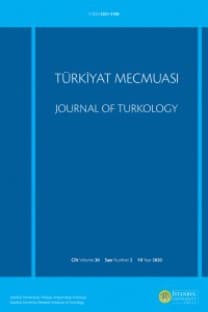Analysis of Syntactic Errors in Translation From Russian to Kazakh Language
___
- Azhayev S. A., I. A. Ishigov, B. T. Tastemirova. “The Culture of Speech in The Medical Educational System”. Bulletin of National Academy of Sciences of The Republic of Kazakhstan. Volume 1, Number 371 (2018): 195 – 199 (in Rus.)
- Banarlı, Nihad Sami. Türkçenin Sırları, 24.Baskı, İstanbul, Kubbealtı, 2007. Banguoğlu, Tahsin. Türkçenin Grameri, 9. Baskı, Ankara, TDK yayınları, 2011.
- Demir, Nurettin - Emine Yılmaz. Türk Dili-El Kitabı, 3. baskı, Ankara, Grafiker yayınları, 2006. Edwin, Arnold. Simple Transliteral Grammar, London, 1877.
- Encyclopedic of Linguistic Dictionary (1990). (Лингвисти́ ческий энциклопеди́ ческий слова́рь (ЛЭС)) https://ru.wikipedia.org/wiki/%D0%9A%D0%B0%D0%BB%D1%8C%D0%BA%D0%B0_ D0%BB%D0%B8%D0%B D%D0%B3%D0%B2%D0%B8%D1%81%D1%82%D0%B8% D0%BA%D0%B0)#:~:text=%D0%9A%D0%B0%CC%81%D0%BB%D1%8C%D0%BA%D0%B0%20 ( % D 0 % B E % D 1 % 8 2 % 2 0 % D 1 % 8 4 % D 1 % 8 0 . , % 3 A % 2 0
- %D1%81%D 0%BB%D0%BE%D0%B2%D 0%B0%2C% 20%D0%B2%D 1%8B
- %D1%80%D0%B0%D0%B6%D 0%B5%D0%BD%D0%B8%D1%8F%20%D0%B8%20
- %D1%84%D1%80%D0% B0%D0%B7%D1%8B (Erişim: 30.08.2020)
- Ergin, Muharrem. Türk Dil Bilgisi. 1.baskı, İstanbul, Boğaziçi yayınları, 2019.
- Ispolatov A.M. “Односоставные конструкции и методика работы над ними с иностранными учащимися”, Русский язык за рубежом. Выпуск №4 (16) (1970). (“Odnosostavnıe konstruktsii i metodika rabotı nad nimi s inostrannımi uçaşimisya”) http://www.russianedu.ru/magazine/archive/rub/2/3.html (Erişim: 30.08.2020)
- Menz, Astrid. “Slavic Language Influence on Gagauz” (Slav Dillerinin Gagauzcaya Etkisi). bilig, Kış 24, (2003): 23-44
- Nemeth J. Turkish Grammar, Mouton, , S’-Gravenhages, 1962).
- NurbayevaA.M., L.A. Bugеnova. “The Official Language In The Advertising Sector Of The Republic Of Kazakhstan”, Vestnik КазНПУ им. Абая, серия «Филологический науки», №2 (68), (2019) (in Rus.)
- Özkan, Fatma – Bağdagül Musа. “Yabancı Dillerin Türkçenin Söz Dizimi Üzerindeki Etkisi” bilig, Yaz, sayı 30, (2004): 95-139
- Soper J. J. Loan Syntax İn Turkic And İranian, Bloomington, İndiana, 1996.
- Аманжолов, Сәрсен. Қазақ әдеби тілі синтаксисінің қысқаша курсы / Павлодар: Павлодар мемлекеттік ун- ті–Қазақ тіл білімінің антологиясы, 2008 (Amanjolov, Särsen. Qazaq ädebî tili sintaksisiniŋ qısqaşa kursı)
- Архипова Л.В. (Составитель). Безличное Предложение / Методическая разработка для преподавателей русского языка как иностранного и студентов – иностранцев подготовительного факультета, Изучающих русский язык, Издательство ФГБОУ ВПО «ТГТУ» Тамбов, 2015 УДК 811.161.1(076) ББКШ13(Рус)-2-96 Б39, 2015 (Arhipova L.V. Bezliçnoye Predlojenie/ Metodiçeskaya razrabotka dlya prepodavateley russkogo yazıka kak inostrannogo i studentov – inostrantsev podgotovitel’nogo fakul’teta, izuçayuşih russkiy yazık) https://docplayer.ru/28264583-Bezlichnoe-predlozhenie.html (Erişim: 30.08.2020)
- Аханов, Кәкен. Грамматика теориясының негіздері, Алматы, Санат, 1996. (Ahanov, Käken. Grammatika teoriyasınıŋ negizderi)
- Ахманова О. С. “Словосочетание”, Сб. Вопросы грамматического строя, АН, Москва, 1955. (Ahmanova O.S. Slovosoçetaniye/ Voprosı grammatiçeskogo stroya)
- Аширова А., «Mеңгеріле байланысқан есімді сөз тіркесінің түрлері», Қазұу Хабаршысы, Әл-Фараби атындағы Қазақ Ұлттық Университеті, Алматы, 2012, 49-52бб. Ashirova Anar Tishibaevna (2012). Types Of Phrases By Management Connection. [QazUU Habarshisi], Әл-Фараби атындағы Қазақ Ұлттық Университеті, №1 (135), (2012): 49-52бб. (in Kaz.) (Aşirova A., “Meŋgerile baylanısqan esimdi söz tirkesteriniŋ türleri”)
- Байтұрсынов, Ахмет. Тіл тағылымы, Алматы, Ана тілі, 1992. (Baytursınova, Ahmet. Til tağılımı)
- Балақаев М. - Т. Сайрамбаев. Қазіргі қазақ тілі, 3-басылуы, Алматы, 1997. Balaqayev M.-T. Sayrambayev.
- Qazirgi qazaq tili)
- Балақаев, Мәулен. Қазіргі қазақ тілі: сөз тіркесі мен жай сөйлем синтаксисі, Алматы, 1992. (Balaqayev, Mäwlen. Qazirgi qazaq tili: söz tirkesi men jay söylem sintaksisi)
- Баскаков Н. А. “Структура простого предложения в тюркских языках” // Труды института языка и литературы АН Кирг. ССР. Вып. VI. -Фрунзе, 23, (1956). Баскаков H.A. Предложение и словосочетание в тюркских языках (Baskakov N. A. “Struktura prostogo predlojeniya v tyurkskih yazıkah // Trudı instituta yazıka i literaturı. Baskakov N.A. Predlojeniye i slovosoçetaniye v tyurkskih yazıkah)
- Есембеков, Темірғали. «Аударма туралы заң қажет», «қамшы.кз» ақпараттық порталы, 20 Мамыр 2012 (Esembekov, Temirgali. “Awdarma turalı zaŋ qajet”) https://qamshy.kz/article/38-temirghali-esembekov- audarma-turaly-zanh-qadget (Erişim: 30.03.2014)
- Есембеков, Темірғали. «Аударма ісінің ахуалы қалай?», «Ана тілі» газеті, 7 Қаңтар 2010 (Erişim: 30.03.2014) (Esembekov, Temirgali. “Awdarma isiniŋ ahuwalı qalay?”)
- Қордабаев Т. Р. Тарихи синтаксис мәселелері, Алматы, Ғылым, 1964. (Qordabayev T.R. Tarihî sintaksis mäseleleri)
- Марданов Ш.К. “Русские “кальки” в узбекском литературном языке” Тюркологические исследования.
- Ilim, Frunze, (1986). (in Rus.) (Mardanov Ş.K. “Russkie “kal’ki” v uzbekskom literaturnom yazıke”)
- Покровская Л. А. “Принципы исследования синтаксических изменений в тюркских языках” Проблемы современной тюркологии. Ленинград, (1980). (Pokrovskaya L.A. “Printsipı issledovaniya sintaksiçeskih izmeneniy v tyurkskih yazıkah)
- Сайрамбаев Т. Қазіргі қазақ тіліндегі күрделі сөз тіркестері, Алматы, Мектеп, 1981 (Sayrambayev T. Qazirgi qazaq tilindegi kürdeli söz tirkesteri)
- Yayın Aralığı: 2
- Başlangıç: 1925
- Yayıncı: İstanbul Üniversitesi Türkiyat Araştırmaları Enstitüsü
Orhan Pamuk’un Roman Kuramı Üzerine
Osman Fırat BAŞ, Olga ŻYMİNKOWSKA
Eski Osmanlı Topraklarında Mülkiyet Davaları: Selanik 1917-1922
Mütareke Döneminde Prens Sabahattin Yanlısı Bir Siyasi Oluşum: Sulh ve Selâmet-i Osmâniyye Fırkası
Kâtib Çelebi’den Seyyid Es‘ad Efendiye 17. Yüzyılda İklîm-i Rûm Şehirleri
Hümeyra YILDIRIM IMRENYI, Celile ÖKTEN
Tanzîmât Döneminde Osmanlı Hariciyesinde Ataşelik Memuriyetinin Teşekkülü
